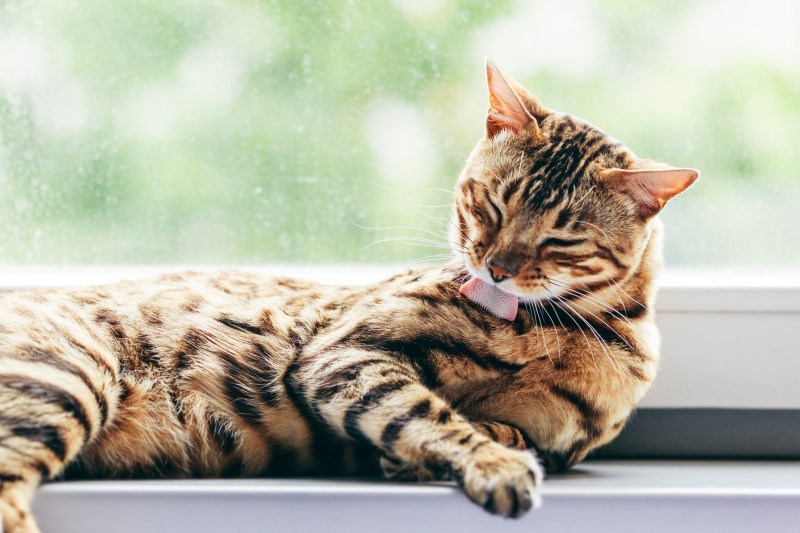We have all heard people use the phrase “pulling my hair out” when dealing with a difficult situation or at their wit’s end. Did you know that in certain circumstances, a cat’s stress response to a difficult situation or anxiety may be to pull their own hair out by overgrooming?
In the feline world, this condition is known as psychogenic alopecia or self-trauma. Owners will typically notice a thin or uneven hair coat in certain areas, or even bald spots. It can happen anywhere on a cat’s body, but common areas are the tummy (ventral abdomen), inner thighs, and flanks (sides of the abdomen). Some cats will become so compulsive in their behavior that they will develop severe redness, infection, and pain at the sites of overgrooming. And, if the skin is compromised, they may even develop an infection.
What Causes Psychogenic Alopecia?
Psychogenic alopecia starts with an emotional trigger or stressful event. The exact stressor can vary by cat, but common causes include:
- Moving to a new place or moving things around in your current space
- New pets in the household
- Being chased by (or in fear of) a dog in the house
- Living with an aggressive cat in a multi-cat household
- Outdoor stressors for indoor-only cats (other cats or wildlife seen from a window)
- Bird feeders near windows (too much excitement might not be a good thing)
- A new baby or housemate
In a case of feline psychogenic alopecia that I treated; we could not figure out the underlying stressor. Our only option was to treat the symptoms of anxiety. Turns out, the cat was frustrated because it couldn’t reach a pet lizard kept out of reach in their family’s home. Once the lizard died, the cat was no longer frustrated and abruptly stopped overgrooming.
Diagnosis of Stress-Related Overgrooming
Diagnosis of psychogenic alopecia can be difficult, since there is no specific test, and many owners don’t actually witness their cat overgrooming. Cats like to hide their symptoms and they will typically do their overgrooming at night.
When a cat presents for overgrooming, self-trauma, or hair loss, we first need to rule any other underlying causes. Your veterinarian will check for fleas (flea allergic dermatitis) and other parasites with tests like skin scrapings and fungal cultures. They may also run lab work, including blood analysis and a urinalysis, to check for any underlying organ dysfunction or metabolic concerns (thyroid issues or diabetes). If all tests for parasites are negative and lab work is normal, a food or steroid trial may be recommended.
In this case, steroids are used to treat a possible underlying seasonal allergy. In theory, if your cat is overgrooming due to stress, then a steroid dose should not help stop the problem. One concern with this course of action is that most cats with psychogenic alopecia present with baldness, severe redness, and inflammation. Often, there is a secondary skin infection as well. Initially, these cats improve from antibiotics and steroids, but once the skin is cleared up and treatment finished, the cat will go back to having bald patches in a few months. The anxiety or stressor has not been identified, so the issue hasn’t been addressed.
Treating Overgrooming
Once all other possibilities are ruled out, and the diagnosis is made, treatments for stopping the compulsive behavior can begin. Your veterinarian will have a discussion with you so that you can formulate the best plan for your cat. It can be as simple as moving bird feeders or more complicated if the stressor can’t be removed, like in the case of a new baby in the household.
In these instances, medical therapy may be necessary to make your cat more comfortable, which can include:
- Pheromone therapy in the forms of collars and sprays, which can help decrease anxiety and stress. Pheromones are chemicals produced by a cat for communication. One example of a manmade version is Feliway.
- Fluoxetine (Prozac), a human antidepressant.
- Amitriptyline (Elavil), an antihistamine that can help decrease stress and stop itching.
- Clomipramine (Clomicalm), another antidepressant.
- Veterinary Acupuncture and some alternative medical therapies may also help reduce stress.
Your veterinarian will review side effects and pros and cons of each medication, as well as duration of treatment.
Other Ways to Manage Feline Stress
Unfortunately, the stressor can be difficult to identify. The good news is that enriching your cat’s environment can help. Providing perches or cat trees in the house is a good start. There are many options that you can buy or build that can keep your cat engaged and stop them from obsessing over any stress triggers. Some people even create “catios” so that their cat can safely relax outside. Do an online search for the word “catio” and you will find many different examples to suit any budget.
Scheduling regular play time with your cat for exercise and interaction can also help reduce stress, just like in people.
Make Sure Your Cat Is Happy
Psychogenic alopecia is one of many causes of hair loss and dermal conditions in cats. When diagnosed, it can be very frustrating if you are unable to find the underlying stressor. However, if you can help keep them happy and engaged, you may be able to alleviate your cat’s anxiety and improve their condition without finding the initial trigger.
Prescription antidepressants or mood modification medicines are available for cats. However, you should consult with your veterinarian, rule out other underlying causes, and stabilize their environment before considering these options.
Pet insurance can help pay for unexpected vet bills. Get a pet insurance quote from AKC Pet Insurance today (underwritten by Independence American Insurance Company) and prepare for accidents, illnesses, and much more.
,

